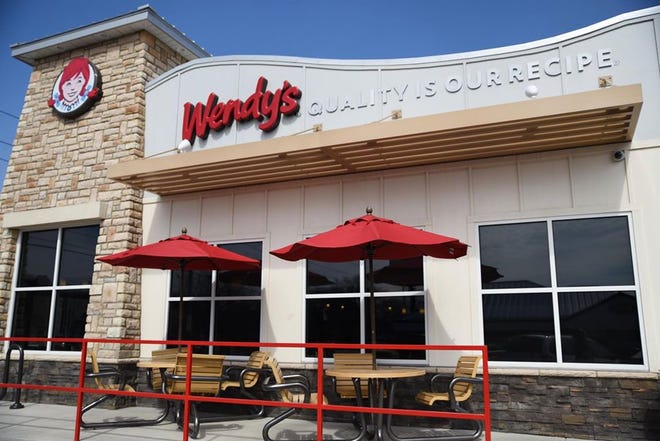The Supply Chain for Wendys Burger Chain Includes Beef Cattle Farmers

The ad slogan "Where's the Beef" is taking on a whole new meaning for fast food chain Wendy's.
Multiple reports and social media accounts suggested some Wendy's locations are out of beef, which means customers can't order burgers.
In a note released Tuesday, Stephens analyst James Rutherford said nearly 1 in 5 Wendy's restaurants were out of beef because of its "famous focus on fresh beef."
In a statement obtained by USA TODAY, Wendy's said some menu items may be "temporarily limited" at some restaurants.
"It is widely known that beef suppliers across North America are currently facing production challenges," said Wendy's in a statement. "We continue to supply hamburgers to all of our restaurants, with deliveries two or three times a week, which is consistent with normal delivery schedules. However, some of our menu items may be temporarily limited at some restaurants in this current environment. We're working diligently to minimize the impact to our customers and restaurants, and continue to work with our supplier partners to monitor this closely."
Rutherford noted the shortages don't appear consistent across the country, and some states, including Michigan, Ohio and Tennessee, are more affected than others.
A tweet from user @amberlyno shows a sign plastered on a Wendy's drive-thru menu alerting customers to the lack of burgers. "We are currently experiencing issues with our meat processing supplier + are unable to serve beef products," the sign says.
Other Twitter users posted photos from drive-thrus or screenshots from the Wendy's app indicating the inability to order beef items from the menu.
Taking advantage of the shortage was meat alternative Beyond Meat, which makes burgers and sausage from pea protein. The company said Tuesday it's launching new value packs to entice consumers while rival Impossible Foods is expanding sales to more than 1,700 Kroger groceries.
Moving more product
To reduce the number of livestock animals being euthanized and filling the supply chain, Wisconsin interim Ag Secretary Randy Romanski sent a letter to the USDA asking the agency to grant a temporary short-term exception to allow state-inspected meat to be sold or donated across state lines.
Wisconsin's interim agriculture secretary is asking the USDA to grant a temporary exception allowing state-inspected meat to be sold or donated across state lines. In a letter to the director of the regional Food Safety and Inspection Service, Randy Romanski said the short-term exception would allow more livestock through slaughter facilities, thus cutting down on the number of animals being euthanized and making more meat available to consumers.

"We have shown evidence that our state meat and poultry inspection program is "at least equal" to federal requirements," Romanski told the agency. "Furthermore, Wisconsin has been a leading state in the Cooperative Interstate Shipment program, in which our program is deemed to be the same as the federal program. In the past decade, the flexibility in the CIS program has allowed Wisconsin livestock farmers and meat processors to reach new markets and benefited the state's entire agriculture industry."
The interim Secretary pointed out that The COVID-19 public health emergency has created challenges across the food supply chain that we have never seen before.
"The closures of large processing facilities are causing market-ready livestock to back-up on our farms and severely limiting options for dairy farmers to ship their cull cattle. We are greatly concerned about the welfare of these animals and the ability of our farmers to locate an alternative market," he wrote.
Romanski added that his staff has been "working tirelessly to identify state-inspected main street meat processors who may be willing to slaughter and process even an extra dozen animals a week."
"Our state meat inspectors stand ready to provide additional slaughter inspection days as necessary. We feel that new partnerships between farmers, processors, and consumers or food donation programs are vitally important in responding to this pandemic," he added.
While many consumers and food donation programs are located across state lines, Romanski says the state wants to open channels allowing them to receive meat from Wisconsin livestock producers and meat processing plants if they are able.
"In Wisconsin, we want to do everything we can to keep our livestock, including cattle, hogs, and poultry, moving through the food supply chain, rather than being humanely euthanized. In a time when so many families are lacking access to nutritious, affordable food, we need to do all we can to put meat on consumers' tables, whether it is purchased at the grocery store or received from a food pantry," he concluded.
Colleen Kottke from the Wisconsin State Farmer contributed to this report
Source: https://www.wisfarmer.com/story/news/2020/05/06/wendys-limits-menu-items-while-wi-producers-eager-supply-product/5175849002/
0 Response to "The Supply Chain for Wendys Burger Chain Includes Beef Cattle Farmers"
Post a Comment